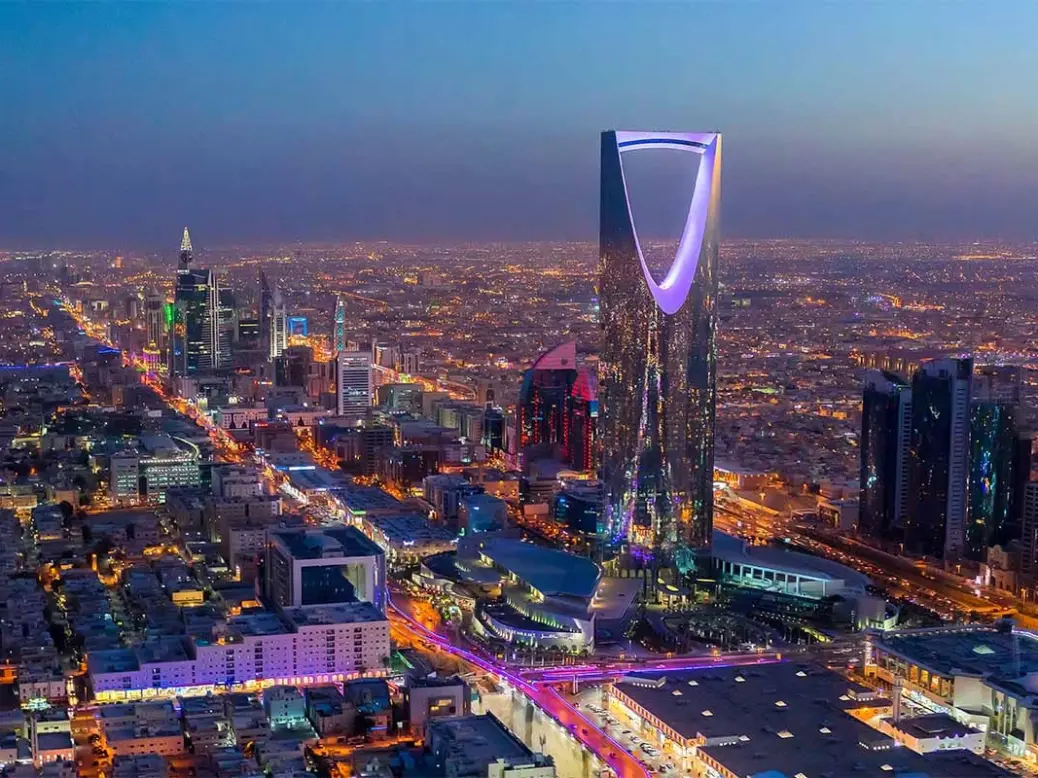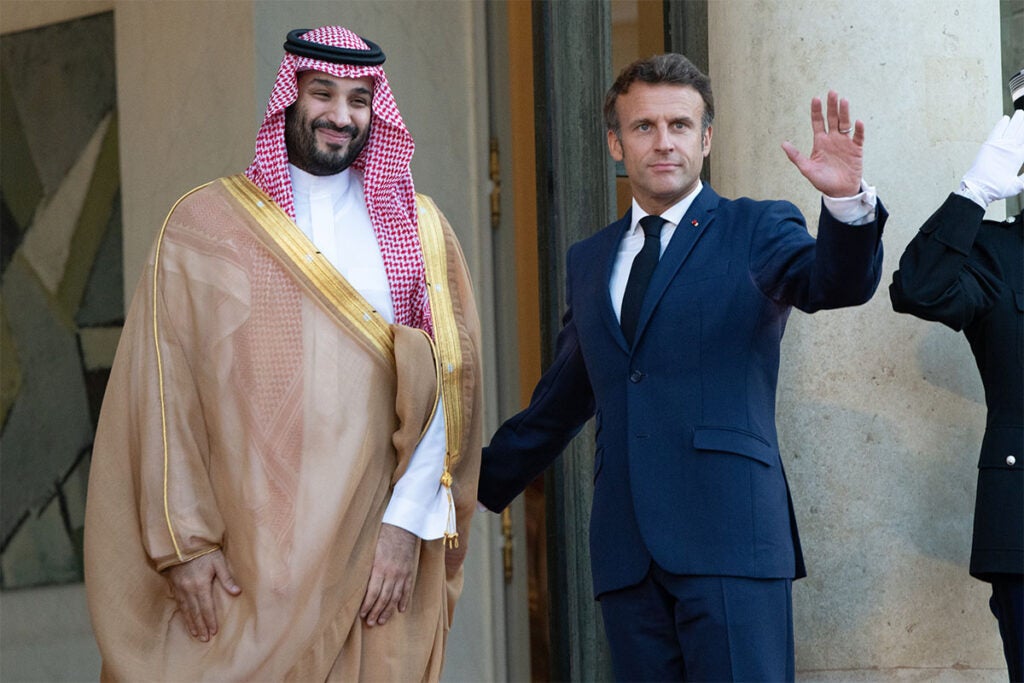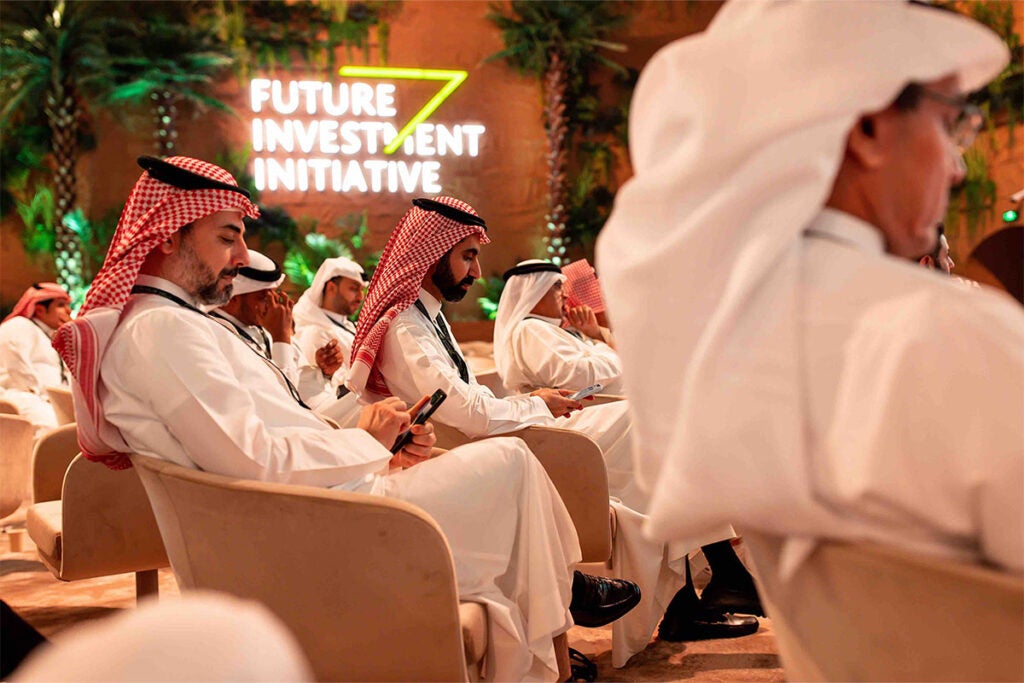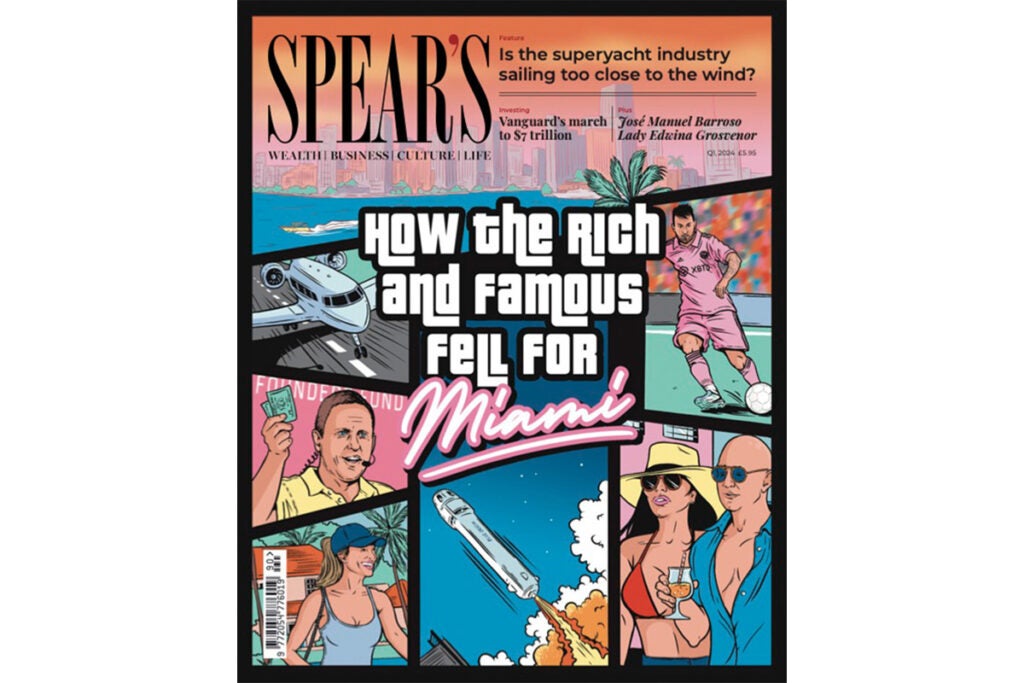
Not many flights start with a formal prayer, but an appeal to Allah to grant ‘righteousness and piety in this journey of ours’ interrupts the in-flight entertainment on Saudia jets before they leave London. As the verses blast from the loudspeakers on the plane, the first-time western traveller to the kingdom might be forgiven for feeling a little apprehensive. But then something remarkable happens. I land in Riyadh and walk into the most thrilling social and economic experiment the modern world has seen.
[See also: How the rich and famous fell for Miami]
Almost every preconception I might have had of the country is confronted and confounded. The Saudia representative who meets me off the plane at King Khalid airport is a fast-talking US-educated woman called Nour. She speed-walks me through to the immigration desk at the new Saudia terminal and hands my passport to the immigration officer. She checks my online e-visa is in order and takes my photograph and fingerprints to speed future visits.
Outside in the soupy evening air, Nour introduces me to a driver – another woman – ready to take me to the Radisson Blu hotel in the diplomatic quarter. Who is the first person I meet when I walk into the lobby to check in? Sadio Mané, the Senegal and former Liverpool striker. He now plays for Riyadh-based Saudi Pro League club Al Nassr.
Vision 2030

Crown Prince Mohammed Bin Salman, Saudi Arabia’s de facto ruler whom everyone calls MBS, wants many more people to follow in Mané’s, my and many others’ footsteps. He is lavishing more than $100 billion on tourism and sport – one tenth of the total budget for his Vision 2030 programme, which he hopes will diversify the economy to secure a future in the post-oil era for his youthful population.
[See also: These are the new super-prime property hotspots to know]
Saudi has wrested control of global golf though the LIV golf tour, hosts an annual F1 race, will stage the 2029 Asian Winter Games in its northern mountains and has just won the bid for the 2034 football World Cup. Expect to hear a lot more about these and other attractions, such as Sindalah, the Red Sea Project and AlUla from Ahmed Al Khateeb, Saudi Arabia’s tourism minister. He hopes to drive up visitor numbers from near zero – excluding religious tourists – to more than 100 million a year by 2030.
To help all the new visitors get to the kingdom, Saudia, which is state-owned, is almost doubling in size from 177 aircraft to 317 over the next five years. It will be supported by Riyadh Air, a new carrier created by Tony Douglas, the former boss of Heathrow. He is splurging $37 billion on a fleet of 72 lavender-coloured Boeing 787 ‘Dreamliner’ long-haul jets, which will start flying in 2025 to 100 destinations from an expanded six-runway airport in Riyadh.
Almost 300,000 new hotel rooms are planned across the kingdom, nearly double the number already created in Dubai, the region’s tourism hub. Fahd Hamidaddin, chief executive of the Saudi Tourism Authority, says: ‘People used to come for oil. Now they come for tourism. We are turning a new page.’
[See also: Abu Dhabi’s ascension: hedge funds invest as UAE cements reputation as global hotspot]
Fine – but what do Saudi leaders say to those who might be nervous about visiting the kingdom? It is only five years since the murder of the Saudi-born Washington Post journalist Jamal Khashoggi in the Saudi consulate in Istanbul. The crown prince, who rose to power in 2017, has crushed opposition to his rule, even detaining members of his own family and high-profile business leaders. Some were reported to have been tortured.
‘Everyone is very welcome to visit and we want you and others to regard Saudi Arabia as your second home,’ Princess Reem Al Saud, director of communications for the Future Investment Initiative Institute, which organises the annual ‘Davos in the Desert’ summit in Riyadh, tells me over dinner in the VIA Riyadh mall.
‘Everyone is welcome’

What about gay tourists? Can two men or two women share a hotel room and travel as a couple? Can unmarried couples visit? ‘Yes. Everyone is welcome,’ Hamidaddin says without hesitation. ‘We never ask private, personal questions.’ He adds: ‘Like any other country, we simply expect visitors to respect our culture and follow the public rules of conduct.’ That means no public displays of affection between couples – gay or straight – which is the norm across the Gulf states. Women do not have to wear an abaya.
You might think that such sentiments are window dressing, disingenuous even. But judging by the social revolution under way on the streets, it’s very real. There were plenty of openly gay delegates on stage at Davos in the Desert in October, and gay artists regularly perform in the kingdom. The crown prince has stripped the fearsome religious police of their powers to harass and arrest anyone they thought was not behaving in a suitably devout manner in public. He has repealed laws that had severely restricted women’s opportunities to work and had banned them from driving, and from travelling, working and socialising freely with men.
[See also: How the UAE’s approach to tax is evolving]
Take a stroll in the Cenomi U Walk mall in Riyadh and it looks like any mall in any of the other Gulf states. There’s music, some dancing, entertainment – from movies to bowling – and young men and women socialise freely, many wearing Western dress. None of this was possible as recently as six years ago. When I ask young Saudis how they feel about all the changes, one tells me: ‘We’re a giant who has been asleep and we are waking up.’ Many describe themselves as ‘not Generation Z, but generation MBS’.
There are still plenty of ifs and buts. The crown prince is young and critics say he can be rash. His administration can be thin-skinned, to put it mildly. In 2022 a Saudi court sentenced a Leeds University medical student, Salma al-Shehab, to 34 years in prison over criticism of the Saudi leadership on her social media accounts, having arrested her when she visited the kingdom in 2021.
Generation MBS
Saudi leaders have in the past tended not to engage in public with the kingdom’s detractors, but in a remarkably candid interview with Fox News in September – his first in English – the crown prince confronted his critics head-on. He conceded that Khashoggi’s death ‘was a mistake, painful’. He said he was ‘reforming the security system to be sure these kinds of mistakes do not happen again’. He has denied US suggestions that he personally ordered the hit. He went on to say he is reforming the country’s outdated laws, including those covering criticism of the regime. ‘Do we have bad laws? Yes. Are we changing that? Yes,’ he said.
One law that has not been changed is the ban on alcohol, but many suspect it will gradually be lifted in tourist hotels. ‘Were there quite a few boozy parties on yachts just a few hundred yards offshore after the Formula One race in Jeddah earlier this year,’ one local hotelier asks rhetorically. ‘That is the first step.’
[See also: Introducing Spear’s Magazine: Issue 90]
As Saudi Arabia invests more in tourism and sports, the question is: is the crown prince ‘for real’? Those who work with him insist he will not row back on his social and economic vision.
‘He wants progress every day,’ says Jerry Inzerillo, who masterminds the $65 billion Diriyah Gate new city for 100,000 people. ‘He gives us everything but sleep.’ International observers praise his handling of the war in Gaza. ‘He has signalled his support for Palestinians as he must to send the right signals to “the Arab street” but has backed the US and other nations’ efforts to stop the conflict spreading,’ says one Washington-based political analyst.
Could Saudi Arabia combine economic reforms on the scale of China in the past three decades with the social reforms on the scale of post-apartheid South Africa? It is one of the biggest and most compelling questions of the next 30 years, and right now few would bet against MBS pulling it off.
This feature is published in Spear’s Magazine Issue 90. Click here to subscribe








